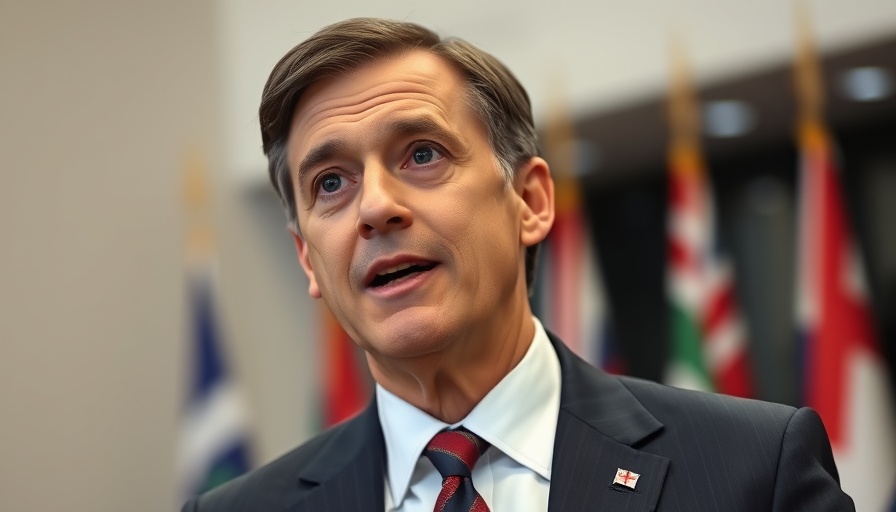
Trump's New Tariff on Brazil: A Shift from Economics to Personal Grudges
In a surprising political maneuver, U.S. President Donald Trump has declared a staggering 50% tariff on Brazilian imports, a decision tied closely to his support for former Brazilian President Jair Bolsonaro. Published on July 9, 2025, this development sheds light on how personal relationships can shape international trade policies.
The Context Behind the Tariff
Trump's declaration comes in the wake of Bolsonaro's trial concerning charges of attempting to overturn the results of the 2022 Brazilian presidential elections. This trial has drawn widespread criticism from those supportive of Bolsonaro, including Trump himself, who referred to the legal proceedings as a "Witch Hunt that should end IMMEDIATELY" in a statement on Truth Social. The implications of this tariff go beyond mere economics; they highlight the intersection of personal ties and statecraft.
Trade Relations and Their Broader Implications
The introduction of such hefty tariffs could signify a departure from the conventional metrics used to gauge trade relations, marking a shift towards politically motivated economic measures. Under Section 301 of the Trade Act of 1974, Trump claims he is launching an investigation into Brazil's trade practices, specifically targeting what he deems unfair actions infringing upon U.S. interests. This investigation is especially alarming as it blurs the lines between international diplomacy and domestic political warfares.
Understanding the Economic Landscape
Economically, the ramifications of a 50% tariff could be seismic for Brazilian brands exporting to the U.S. As a major player in sectors like agriculture and minerals, Brazil stands to lose significantly in trade balances, which could lead to increased prices for consumers and potentially disrupt supply chains across many industries. This move invites concerns of retaliation, with Brazil's government likely compelled to respond in kind to protect its economic interests.
Trump's Trade Strategy: A New Playbook?
Through this development, Trump appears to be crafting a new framework for trade relations—one that operates not solely on reciprocal benefits but rather on personal alliances and political sentiments. This has drawn parallels to past tariffs levied by other nations as a means of asserting political pressure. While some analysts suggest such a strategy could provide short-term leverage, others argue it risks alienating key trading partners.
The Reactions to This Tariff Implementation
The international community has reacted with a mix of alarm and skepticism. Meanwhile, the Canadian government, which is closely watching these developments, is preparing for potential ripple effects in the North American trade landscape. Canada’s Minister of Innovation, Science and Industry expressed concern, indicating that global trade dynamics could shift dramatically as countries reconsider their interactions with the U.S. under Trump's leadership.
What This Means for U.S.–Brazil Relations
Historically, the U.S. and Brazil have maintained a complex relationship, balancing cooperation with friction due primarily to issues like trade agreements and environmental policies. Trump's decision to link tariffs to Bolsonaro's legal issues raises questions about the future of bilateral relations. Observers are left speculating whether this tariff will become a long-term fixture in U.S. trade policy or if it is merely a tool for Trump's political agenda.
Future Predictions: What Lies Ahead?
As this situation evolves, monitoring the global response will be crucial. Should Brazil retaliate, it may instigate a trade war that could further complicate diplomatic relations. Additionally, Trump's strategic focus on mobilizing his base through tariffs could expand into other regions, inviting scrutiny and potential backlash. Economists warn of possible recessionary pressures as countries redefine their trade policies in this politically charged climate.
Final Thoughts on Tariff Impacts
Understanding the multifaceted implications of Trump's tariff on Brazil means recognizing the nuanced interplay between personal relationships and international economics. As this narrative unfolds, it’s imperative to keep examining how personal grudges manifest in policymaking and their ultimate effects on global trade. In the world of politics, it seems personal vendettas can easily translate into economic warfare.
 Add Row
Add Row  Add
Add 




 Add Row
Add Row  Add
Add 

Write A Comment